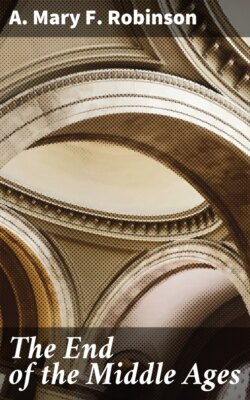Читать книгу The End of the Middle Ages - A. Mary F. Robinson - Страница 27
На сайте Литреса книга снята с продажи.
III.
ОглавлениеTable of Contents
And how shall the Mystic reach this obscure and inner depth, this silence where the soul is one with God? By sinking into himself. For the Mystic there exists no exterior world. Since God is within us, what value is there in the world without? “Omnes creaturæ sunt purum nihil,” formulates Master Eckhart. For the Mystic the body is only a prison, a distortion, a hindrance; its senses, its experience cannot teach him. “Being freed from the folly of the body,” said Plato, “we shall of ourselves know the whole real essence.” “Matter,” says Plotinus, “is the principle of individuation, and who would seek the one must quit the things of matter.” Without the body, then, we were no longer personal, no longer separate; we were all One and all God. It is the body which determines our character; there is no personality in the soul. We must conceive it as pure water poured into a coloured vase, which becomes red, or blue, or green, according to the colour of the vase. The colour is not a principle of the water, and does not affect the water. So the soul poured into the body appears to take a note and colour of its own, but, poured out again, is seen to be unaltered. The first aim of the true Mystic is to purify his spirit from this extraneous and earthly tint; to make the vase, if he can, as colourless, as simple and uniform as that infinite Being, of which, in Erigena’s phrase, the Soul is the last descent.
Since the soul is God the world is nothing. No more than the eye can taste or the ear handle, can the created comprehend the Divine. “If we are to know anything purely,” we read again in Plato, “we must be separate from the body.” And Plotinus adds that he who enters in quest of the One must ascend to the First Principle of his own nature. The First Principle of Plotinus is the same as Meister Eckhart’s Foundation of the Soul. It is the One. Intellect may be a means to reach it, but it is certainly not an end. The Mystic philosopher thinks himself into an ecstasy; and the ecstasy, not the thought, is his goal.
Our Mystic has therefore abandoned the world, and abandoned his own experience in the endeavour to attain to God. He must be quite still, passive, dumb; the mystic should be as a new-born child who has not yet smiled in his mother’s face. He must not even will to be made one with God. “He must have no seeking for himself more than has a corpse,” writes Eckhart. “Let him be as one dead,” counsels Suso. “He must not be satisfied with any deed or virtue,” adds the Flemish Ruysbroch, “but only in the Abyss.” And Tauler rises to a passionate eloquence: “Sink thou into thy Depth and thy Nothingness, and let the tower and all its bells fall down upon thee; yea, let all the devils in Hell storm out upon thee; let Heaven and Earth with all their creatures assail thee, yet shall they all but marvellously serve thee. … Sink thou only into thy Nothingness, and the better part is thine.”
